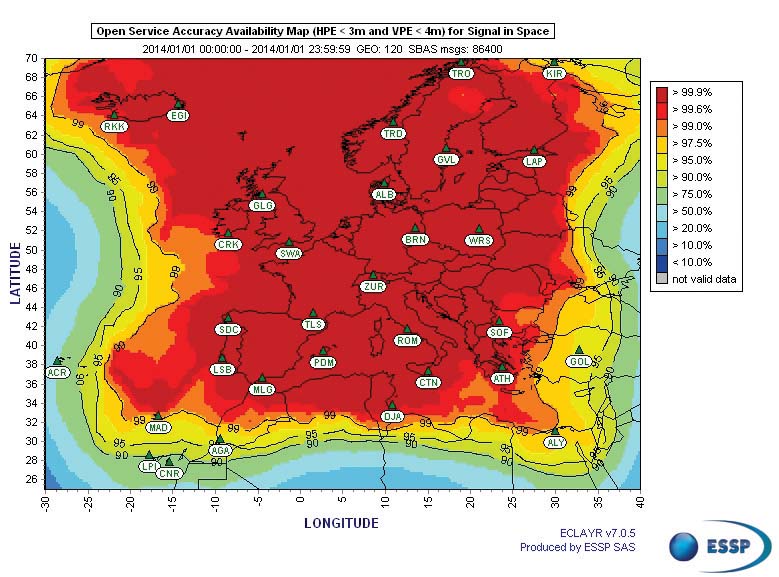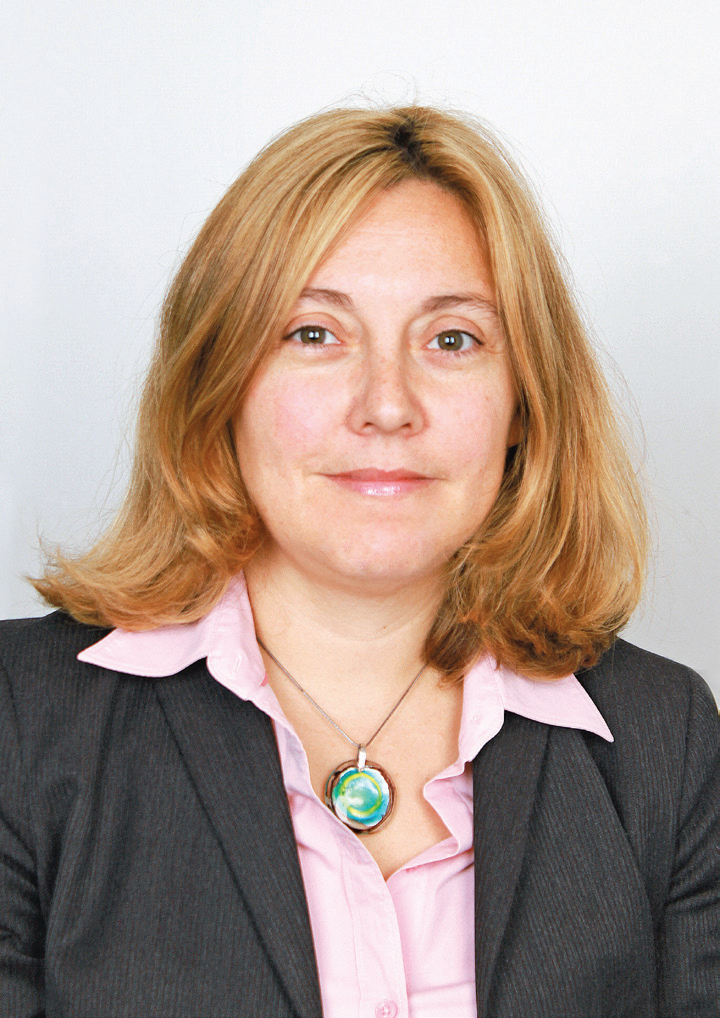The EU is helping countries in North Africa and the Middle East utilise Galileo’s services. With its Galileo constellation rapidly taking shape, the European Union has opened lines of communication with countries in North Africa and the Middle East with a view to assisting their governments and businesses to utilise the satellite services that extend across the Mediterranean. The services available to countries are provided through the European Global Navigational Satellite System (E-GNSS), which includes a

Galileo’s coverage is continuing to expand
The EU is helping countries in North Africa and the Middle East utilise Galileo’s services.
With its Galileo constellation rapidly taking shape, the European Union has opened lines of communication with countries in North Africa and the Middle East with a view to assisting their governments and businesses to utilise the satellite services that extend across the Mediterranean. The services available to countries are provided through the European Global Navigational Satellite System (E-GNSS), which includes also the European Geostationary Navigation Overlay Service (EGNOS). The EGNOS system corrects typical GNSS errors such as the ionosphere disturbing the signal and slight discrepancies between the clocks to provide highly accurate positioning data and integrity information.
As part of the MEDUSA (MEDiterranean follow-Up for EGNOS Adoption) project, under the Euromed GNSS II umbrella, the potential of these services are being explained in a series of actions, aimed at awareness, capacity building and technological transfer. Countries included in this part of the scheme belong to the so-called ‘Euromed’ region: Algeria, Egypt, Israel, Jordan, Lebanon, Libya, Morocco, Palestine, Syria and Tunisia.
EGNOS has three main positioning services: an open service for mass-market applications and two accurate and guaranteed services, one suitable for Safety of Life Service applications and one for commercial purposes, including applications for Intelligent Transport Systems.
EGNOS was conceived for civil aviation needs and airlines flying to and from Euromed countries could benefit from its accuracy and reliability, and these benefits extend to road, rail and maritime, freight transport and logistics sectors. MEDUSA is implementing a programme of technical assistance in the target countries acquainting the main stakeholders with the benefits EGNOS can bring to the various sectors.
“EGNOS provides added value primarily in applications where safety is a must,” said Antonella Di Fazio from6711 Telespazio which is leading the MEDUSA project. “We are working with the Euromed countries to guide potential users in understanding the new technology and how it can help their businesses, and in supporting decision-makers in identifying their intermediate and high priorities in relation to satellite navigation.”
A regional action plan along with individual country plans are being drawn up to support the establishment of a Mediterranean GNSS policy and encourage a common and rational approach to radio navigation, positioning and timing means across all potential sectors.
Di Fazio: “We are working with each government to assist them in the implementation of their individual action plan according to their priorities. We are also offering technical expertise to give countries the tools to create the bases for an optimal adoption of E-GNSS. Most countries’ priority is civil aviation and the approaches to airports. After that they are looking at logistics and intermodal freight transport.”
As the Galileo constellation is still being assembled, EGNOS services are today partly available on the Mediterranean shores of North Africa, and Euromed countries can already prove and use them.
“We have demonstrated the use of EGNOS in approaches in Monastir airport in Tunisia and already containers from Europe are continuously tracked to their destination in Aqaba in Jordan. We have also shown that the high accuracy of EGNOS is a plus for road applications, such as fleet management and dangerous goods tracking and tracing.”
As to other potential users, Di Fazio said: “We have to talk to all key stakeholders, including institutions, the commercial players and those from the research sector. We cannot oblige them to adopt this new technology if stakeholders don’t agree – we need a win-win situation.”
MEDUSA aims to build capacity, transfer technical knowledge and create incubator clusters with early adopters in various domains using common initiatives. As part of the technical assistance programme, MEDUSA operates the Galileo EuroMed Cooperation Office (GEMCO), a cooperation structure located in Tunis, to act as a point of reference for the Euromed countries concerning E-GNSS. GEMCO promotes awareness, organises workshops, facilitates links between Euromed-based stakeholders and the EU, fosters E-GNSS related stakeholder initiatives and provides assistance to ensure the participation of all Euromed countries.
Di Fazio said: “Once the potential applications and benefits of EGNOS are explained we see lots of enthusiasm in the Euromed countries and an increasing active participation in GEMCO. Euromed countries are very interested in learning on how to benefit from EGNOS and on the next move to ensure a complete EGNOS service coverage across their region.”
With its Galileo constellation rapidly taking shape, the European Union has opened lines of communication with countries in North Africa and the Middle East with a view to assisting their governments and businesses to utilise the satellite services that extend across the Mediterranean. The services available to countries are provided through the European Global Navigational Satellite System (E-GNSS), which includes also the European Geostationary Navigation Overlay Service (EGNOS). The EGNOS system corrects typical GNSS errors such as the ionosphere disturbing the signal and slight discrepancies between the clocks to provide highly accurate positioning data and integrity information.
As part of the MEDUSA (MEDiterranean follow-Up for EGNOS Adoption) project, under the Euromed GNSS II umbrella, the potential of these services are being explained in a series of actions, aimed at awareness, capacity building and technological transfer. Countries included in this part of the scheme belong to the so-called ‘Euromed’ region: Algeria, Egypt, Israel, Jordan, Lebanon, Libya, Morocco, Palestine, Syria and Tunisia.
EGNOS has three main positioning services: an open service for mass-market applications and two accurate and guaranteed services, one suitable for Safety of Life Service applications and one for commercial purposes, including applications for Intelligent Transport Systems.
EGNOS was conceived for civil aviation needs and airlines flying to and from Euromed countries could benefit from its accuracy and reliability, and these benefits extend to road, rail and maritime, freight transport and logistics sectors. MEDUSA is implementing a programme of technical assistance in the target countries acquainting the main stakeholders with the benefits EGNOS can bring to the various sectors.
“EGNOS provides added value primarily in applications where safety is a must,” said Antonella Di Fazio from
A regional action plan along with individual country plans are being drawn up to support the establishment of a Mediterranean GNSS policy and encourage a common and rational approach to radio navigation, positioning and timing means across all potential sectors.
Di Fazio: “We are working with each government to assist them in the implementation of their individual action plan according to their priorities. We are also offering technical expertise to give countries the tools to create the bases for an optimal adoption of E-GNSS. Most countries’ priority is civil aviation and the approaches to airports. After that they are looking at logistics and intermodal freight transport.”
As the Galileo constellation is still being assembled, EGNOS services are today partly available on the Mediterranean shores of North Africa, and Euromed countries can already prove and use them.
“We have demonstrated the use of EGNOS in approaches in Monastir airport in Tunisia and already containers from Europe are continuously tracked to their destination in Aqaba in Jordan. We have also shown that the high accuracy of EGNOS is a plus for road applications, such as fleet management and dangerous goods tracking and tracing.”
As to other potential users, Di Fazio said: “We have to talk to all key stakeholders, including institutions, the commercial players and those from the research sector. We cannot oblige them to adopt this new technology if stakeholders don’t agree – we need a win-win situation.”
MEDUSA aims to build capacity, transfer technical knowledge and create incubator clusters with early adopters in various domains using common initiatives. As part of the technical assistance programme, MEDUSA operates the Galileo EuroMed Cooperation Office (GEMCO), a cooperation structure located in Tunis, to act as a point of reference for the Euromed countries concerning E-GNSS. GEMCO promotes awareness, organises workshops, facilitates links between Euromed-based stakeholders and the EU, fosters E-GNSS related stakeholder initiatives and provides assistance to ensure the participation of all Euromed countries.
Di Fazio said: “Once the potential applications and benefits of EGNOS are explained we see lots of enthusiasm in the Euromed countries and an increasing active participation in GEMCO. Euromed countries are very interested in learning on how to benefit from EGNOS and on the next move to ensure a complete EGNOS service coverage across their region.”










